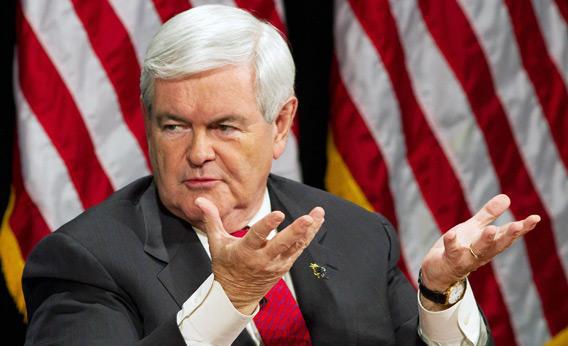IOWA CITY—It’s zany vs. brainy in the Republican presidential race. On Wednesday, Mitt Romney punched back hard at Newt Gingrich, telling the New York Times that the former speaker was “zany,” and the Washington Post that Gingrich was an “extremely unreliable” conservative.
Gingrich responded by remaining on the high road, touting the speech he gave here at the University of Iowa about his proposed Brain Science Initiative. He promised that, as president, he would launch an all-out federal effort to encourage research, train neuroscientists, and speed solutions through the bureaucracy. He claims the initiative would improve health and lower federal health care costs, which would shrink the budget.
With three weeks before the first votes are cast in the Iowa caucus, the two GOP front-runners are following very different strategies. Slaps at Gingrich aside, Romney continues to play traditional and safe. Gingrich is taking risks: His campaign recalls FDR’s plan for a presidency of “bold, persistent experimentation.” It is undeniably in that spirit that a candidate who needs to win Iowa was, instead of touring 99 counties by bus, giving a speech on the nontraditional topic of brain science in a liberal part of the state.
These opposing strategies preview of what their presidencies would be like. The question for Republican voters is whether the Romney’s caution is what has made him inconsistent on issues. He strives to be in the safe and popular place. That is an electoral liability (at least in the Republican primary) and might lead to meandering leadership. As for Gingrich, the question is whether the mad professor can keep his experiments from blowing up and destroying the whole laboratory.
Romney’s Wednesday attack on Gingrich was familiar and straightforward. He criticized Gingrich’s work for Freddie Mac, his spending at Tiffany’s, his temperament, and his lack of stability. Romney is criticizing Gingrich’s reliability and stability, which is not so distant from the flip-flopping charge that plagues Romney himself.
Gingrich seemed almost in repose as he brushed off the Romney attacks. “I think a brain science initiative is a way to help other human beings,” he said responding to a question about Romney’s charges. “I’ll let him decide if it’s zany. … I’m going to focus on positive ideas and positive solutions. I’m taking the gamble that the American people care about actually solving our country’s problems, not just politicians beating each other up.”
Romney’s chief critique is that Gingrich could explode at any minute. So it is wise for Gingrich to respond with flamboyant displays of equanimity and earnest problem solving. He also started airing an ad called “We Deserve Solutions.”
Romney is not the only opponent trying to puncture Gingrich. Ron Paul and Rick Perry are airing anti-Newt advertisements, as is Romney’s super PAC. The National Review penned a reverse endorsement, singling Gingrich out as the one GOP candidate Republicans must avoid. To nominate Gingrich would blow the golden opportunity to replace a weakened president, they wrote. A Wall Street Journal/NBC poll supported their case. Important blocs of general election voters actively dislike him. Women have a 38 percent negative view; only 20 percent view him positively. Forty percent of independents view Gingrich negatively, compared with only 16 percent who view him positively. Suburban residents have a 40/25 negative impression.
Gingrich said that those numbers would turn around once general election voters saw him focused on solutions that help people, such improving brain science. Maybe, but as with the caucus and primaries, the power of his ideas won’t be enough. Sometimes the structural realities are just too much to overcome, no matter how big you think. That’s the problem he faces in Iowa, where his staff is still scrambling to put together an organization. Gingrich is hoping the nontraditional approach will not only save him in the primary but in the general election. For a candidate once left for dead who stuck with his strategy and rose again, it might be a brilliant approach. Or, it might just be zany.
